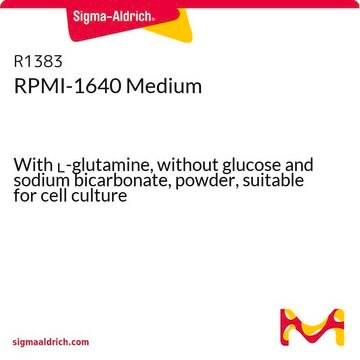R7638
RPMI-1640 Medium
Dutch Modification, with sodium bicarbonate and HEPES, without ʟ-glutamine, liquid, sterile-filtered, suitable for cell culture
Synonim(y):
Roswell Park Memorial Institute 1640 medium
About This Item
Polecane produkty
product name
RPMI-1640 Medium, Dutch Modification, with sodium bicarbonate and 20mM HEPES, without L-glutamine, liquid, sterile-filtered, suitable for cell culture
sterylność
sterile-filtered
Postać
liquid
metody
cell culture | mammalian: suitable
zanieczyszczenia
endotoxin, tested
pH
>7.2
komponenty
sodium pyruvate: no
HEPES: 20 mM
L-glutamine: no
NaHCO3: yes
phenol red: yes
Warunki transportu
ambient
temp. przechowywania
2-8°C
Szukasz podobnych produktów? Odwiedź Przewodnik dotyczący porównywania produktów
Opis ogólny
Zastosowanie
- to obtain spleen and lymph nodes from mice
- for the resuspension of Staphylococcus aureus strains in the phagocytosis assay
- in the isolation of hepatitis B surface antigen-specific B-cell clones
Rekonstytucja
najczęściej kupowane z tym produktem
Kod klasy składowania
12 - Non Combustible Liquids
Klasa zagrożenia wodnego (WGK)
WGK 1
Temperatura zapłonu (°F)
Not applicable
Temperatura zapłonu (°C)
Not applicable
Certyfikaty analizy (CoA)
Poszukaj Certyfikaty analizy (CoA), wpisując numer partii/serii produktów. Numery serii i partii można znaleźć na etykiecie produktu po słowach „seria” lub „partia”.
Masz już ten produkt?
Dokumenty związane z niedawno zakupionymi produktami zostały zamieszczone w Bibliotece dokumentów.
Klienci oglądali również te produkty
Nasz zespół naukowców ma doświadczenie we wszystkich obszarach badań, w tym w naukach przyrodniczych, materiałoznawstwie, syntezie chemicznej, chromatografii, analityce i wielu innych dziedzinach.
Skontaktuj się z zespołem ds. pomocy technicznej





